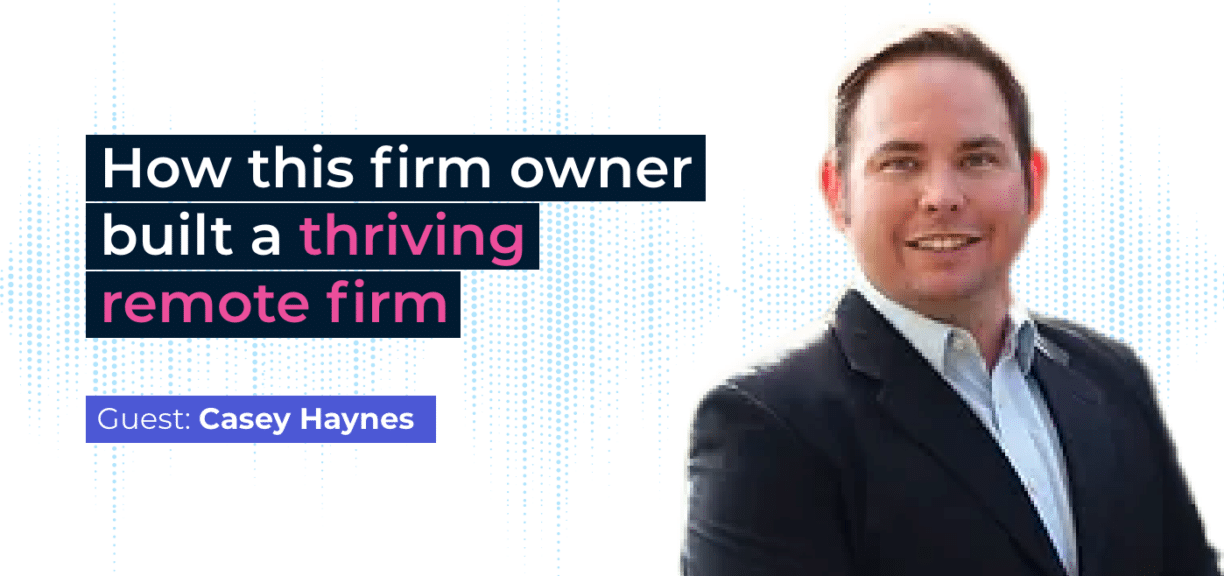S01 E08: How this firm owner built a thriving remote firm
Guest: Casey Haynes
Meet Casey Haynes, the owner of Compass CPA. He owns an accounting firm with 11 team members and over 40 clients.
In this episode, we talk about how to build a thriving remote CPA firm! He shares their tech stack and best practices for keeping your team happy and accountable.
Show Notes:
Host:
Welcome back to another episode of The Accounting Firm podcast where we bring you valuable discussions and insights from accounting firm owners. I’m your host, Shahram Zarshenas and in today’s episode, we have a special guest joining us to share their inspiring journey of how they built a thriving remote firm. Our guest today is Casey Haynes, the founder of Compass CPA. Casey, welcome to the show!
Guest:
Thank you, Shahram. I’m excited to be here and share my experience with your audience.
Host:
It’s our pleasure to have you. To start off, can you tell us a little bit about your background and what inspired you to start a remote firm?
Guest:
Certainly! I come from a traditional office environment, having worked in various companies for over a decade. However, I always felt that the typical nine-to-five setup wasn’t the best fit for me. I craved flexibility and wanted to create a company that prioritized work-life balance for its employees.
Host:
That’s fantastic. So, how did you go about building your remote firm?
Guest:
Well, it was definitely a process. I began by thoroughly researching remote work trends, studying successful remote companies, and learning about the tools and technologies that facilitate remote collaboration. Armed with this knowledge, I set out to create a solid foundation for my firm.
Host:
That sounds like a comprehensive approach. What were some of the challenges you faced during this process?
Guest:
One of the biggest challenges was finding the right talent. Hiring remotely allowed me to tap into a global pool of talent, but it also meant that I had to adapt my hiring and onboarding processes. I had to develop new strategies for assessing skills and cultural fit without in-person interviews.
Host:
That’s an interesting point. Could you share some of the strategies you implemented to address this challenge?
Guest:
Of course. To ensure that I found the right candidates, I implemented a multi-step hiring process that involved initial video interviews, skills assessments, and even trial projects. Additionally, I focused on building a strong company culture by fostering open communication, organizing virtual team-building activities, and providing opportunities for professional growth and development.
Host:
It’s impressive how you adapted traditional hiring practices to suit remote work. How did you establish effective communication and collaboration within your remote team?
Guest:
Communication was key for us. We utilized various tools like project management software, team chat platforms, and video conferencing tools to stay connected and ensure everyone was on the same page. Regular check-ins and virtual meetings helped foster a sense of unity and alignment within the team.
Host:
That’s great advice. In terms of productivity, how do you ensure that your remote team stays motivated and focused?
Guest:
It’s important to set clear expectations and goals from the start. We established transparent performance metrics and provided regular feedback and recognition to keep our team motivated. Additionally, we emphasized the importance of work-life balance and encouraged our employees to take breaks and maintain a healthy work routine.
Host:
Those are valuable insights. Now, looking back at your journey, what are some of the key lessons you’ve learned from building and managing a remote firm?
Guest:
One of the most important lessons I’ve learned is the significance of trust. When you can’t physically see your team members working, trust becomes paramount. Trusting your employees to manage their own time and deliver results is crucial for remote success. Another lesson is the importance of fostering a positive remote work culture through effective communication and collaboration.
Host:
Trust and communication are indeed fundamental in remote work environments. Lastly, what advice would you give to aspiring entrepreneurs who are considering starting a remote firm?
Guest:
My advice would be to thoroughly research and plan your remote business model. Understand the unique challenges and benefits of remote work and build a strong foundation for your company. Invest in the right tools and technologies to support remote collaboration and communication. Additionally, focus on hiring the right talent by implementing effective assessment processes and fostering a strong remote work culture.
Host:
Those are excellent pieces of advice, Casey. Thank you for sharing your valuable insights and experiences with us today.
Guest:
Thank you for having me. It was a pleasure sharing my story. I hope it inspires others to embrace the possibilities of remote work
Subscribe to Newsletter
We're talking high-value articles, expert interviews, actionable guides, and events.

Key Features of a Great Accounting Document Management System
Here’s all you need to know about an accounting document management system and how it can make you more organized and save…
Apr 26, 2024

5 Simple Time-Saving Tips for Managing Uncategorized Transactions
Manually resolving multiple uncategorized transactions steals valuable time from accountants and bookkeepers. But there’s a solution. Here are five simple, time-saving tips…
Apr 24, 2024
